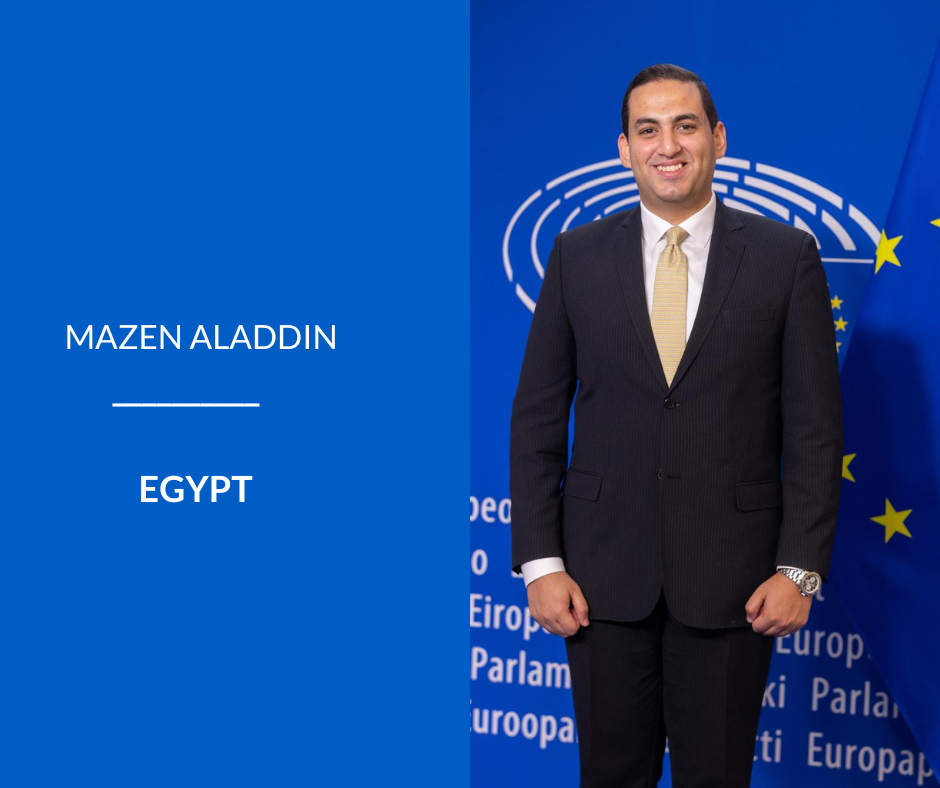Bridging Worlds: A Reflection on My EUVP Experience
By Mazen ALADDIN
In a time of tectonic shifts in international development, where multilateralism faces unprecedented challenges, my participation in the European Union Visitors Programme was an opportunity to witness firsthand how the EU fosters international partnerships, strengthens connections, and navigates its role on the global stage. As someone deeply engaged in international cooperation, this visit was not just a professional experience, it was a journey into the heart of European diplomacy and collaboration, and to see firsthand the democracy in action!

I undertook my EUVP visit during January 2025, drawn by my commitment to strengthening global ties and fostering meaningful partnerships between Egypt and the EU. Given my work at the Egypt HealthCare Authority and my engagement in international development, I saw the EUVP as a unique platform to deepen my understanding of the EU’s policies, governance, and external relations.
While my professional background is rooted in healthcare, my EUVP visit was an opportunity to explore a broader range of topics—diplomacy, cooperation, investment, and global governance.
Throughout my meetings and discussions, I examined:
- How the EU is evolving its external relations, particularly with MENA countries, in light of shifting global power dynamics.
- The role of economic diplomacy in fostering sustainable development and investment opportunities beyond traditional aid models.
- The EU’s strategy for strengthening institutional partnerships, particularly in sectors such as healthcare, education, and digital transformation.
- How Europe is positioning itself in the broader context of global health governance and universal health coverage (UHC), ensuring that its policies remain relevant in an increasingly multipolar world.
A key highlight of my visit was the opportunity to discuss the newly formed Directorate-General for Middle East and North Africa (DG MENA) and its significance in redefining the EU’s engagement with the region. When the Commissioner visited Cairo shortly after my return, I felt a deep sense of connection to this evolving partnership. It was a moment of realisation that I am not just an observer but an active part of this dynamic shift, advocating for stronger ties that benefit both Egypt and the EU.
Beyond policy discussions and institutional visits, the most memorable moments of my EUVP journey were the human connections I forged along the way.
There were intense debates on global health policy, where I found myself deeply engaged in conversations about how Europe can serve as a model for healthcare reforms worldwide. But there were also lighter moments, the shared laughter with fellow EUVP participants over coffee breaks, the spontaneous discussions that stretched late into the evening, and the friendships formed across different continents, bound by a common curiosity about the world.
A particularly fun memory was navigating the labyrinthine corridors of the European Parliament with my colleagues, getting momentarily lost but turning it into an adventure. And, of course, there were the dinner conversations, where exchanges turned into lively discussions about everything from policy reform to the best way to make fries.
My EUVP experience reshaped many of my perceptions about the EU’s role in the world, and my main takeaways were that the EU is not just an institution; it is a complex network of evolving relationships. While often perceived as a rigid bureaucracy, I discovered a system that is adaptable, responsive, and constantly negotiating its position in a rapidly changing world, and that the future of global partnerships is about co-investment, not just aid. The EU is shifting from traditional donor-recipient models toward mutual investment and economic partnerships, a shift that presents new opportunities for countries like Egypt.
Another one of my main takeaways is that diplomacy is built on personal connections as much as policy. While governance structures are essential, the real power of international cooperation lies in the personal relationships that drive negotiations and collaborations forward.
And most importantly, the EU’s commitment to Egypt is a cornerstone in strengthening the Euro-Mediterranean partnership, and it is deeper than ever, with the establishment of DG MENA, and high-level engagements with regional partners. It is clear that Europe is investing in a future of stronger, more strategic cooperation with the Middle East and North Africa.
Finally, global cooperation is being tested like never before, with shifting alliances, increasing geopolitical tensions, and growing isolationist rhetoric in some parts of the world, the very fabric of multilateralism is under strain. The EU, however, remains committed to maintaining strong partnerships and defending the principles of shared responsibility and mutual growth, a stance that is more vital now than ever.
As I reflect on my EUVP experience, I am more convinced than ever that international cooperation is the key to solving the world’s most pressing challenges. Whether in healthcare, governance, or economic development, the future lies in partnerships that are built on trust, shared goals, and long-term vision.
For Egypt and the EU, the potential for deeper collaboration is immense. From strengthening health systems to fostering innovation and investment, there are countless opportunities to build a future that benefits both regions.
For me, the EUVP was more than a visit, it was a moment of realisation. A realisation that despite the geopolitical uncertainties, bridges between nations are still being built, and the work of international cooperation remains as crucial as ever. And if there is one thing I take forward from this journey, it is the belief that the world moves forward when we move together.
Even after my return, I kept my European Parliament badge on my desk, a small but powerful reminder that diplomacy, dialogue, and cooperation are not just ideas we discuss in meeting rooms; they are commitments we carry forward in our daily work, shaping a better future for all.
